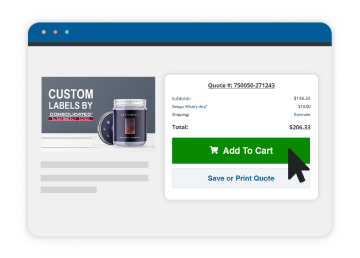As a contract packager, you empower clients to focus on their business by taking production off their plates. But, how much are you focusing on growing your own co-packing business?
The contract packaging industry is full of opportunity. Global factors like trade restrictions and the COVID pandemic have only increased demand. In 2019, the co-packing market was valued at $52.28 billion and is predicted to be valued at $89.74 billion billion by 2026.
With such opportunity comes fierce competition. At Consolidated Label, we work with thousands of contract packaging partners. We know how competitive the landscape is, which is why we’re sharing the top competitive advantages and profitability hacks in the industry today.
3 Strategies To Get A Leg Up On The Competition
There are plenty of ways you can gain a competitive advantage in the co-packing industry. You’ll want to advertise your competitive advantages loud and clear in your promotional materials. Read our top recommendations below to stand out above the competition and attract more business.
Keep The Main Thing The Main Thing By Delivering Quality Products On Time
The number one competitive advantage you can cultivate is also the most basic requirement of a reputable co-packer: top-notch quality.
Clients expect you to be the expert in product manufacturing, packaging, regulations, and quality assurance. They are trusting you to do your job well, and they certainly don’t want to double-check your work. Not only that, as a co-packer you are equally responsible for ensuring regulatory compliance of finished products.
Yet, we still hear horror stories about clients receiving substandard products. Don’t be “that guy.” Implement these quality standards instead:
- Get familiar with your clients’ product regulations
- Hire qualified, experienced staff to oversee quality assurance and regulatory compliance
- Purchase and maintain up-to-date modern equipment that meets client needs
- Maintain adequate space and a clean, well-equipped facility
- Consider regularly providing Quality Agreements (QAs), which define the required responsibilities of the service provider and contract customer, helping avoid confusion and unnecessary disagreements down the line
- Truthfully advertise all of your quality assurance provisions in your marketing and communications
If we boil it down, delivering a quality finished product on time is your one most important job. When clients know they can rely on you, they’ll keep working with your company over the long-haul.
Practice Honest And Open Communication
Equally important to quality production is building trust through honest and open communication. Brands are hiring you as a strategic partner, so they need to trust you’re going to communicate effectively and stick to your word.
Practice the following communication habits:
- Create honest marketing. Is your website honest, or over-hyped? Are your claims true, or are you stretching the truth? Do you adhere to the standards you’ve communicated? Take a good look at your promotional materials and make sure all your claims can be substantiated.
- Truly understand your customer needs. You should vet every prospective client by getting to know them – their business practices, goals, and obstacles. Only by understanding your customer will you be able to deliver truly exceptional service.
- Introduce prospective clients to the team members they’ll be working with. Oftentimes prospects talk with the sales team during sign-up. Let them meet the people they’ll be communicating with regularly to increase a prospect’s confidence in working with you.
- Set expectations early on. Educate clients on how you work. Give them a tour of the facility. Explain how you handle tough or emergency situations. The more clarity you can give prospects, the better.
- Handle scheduling concerns clearly and professionally. Scheduling issues or miscommunications can wreak havoc, making clients very unhappy. Get ahead of frustrations by being upfront about scheduling.
Follow The Latest Contract Packaging Industry Trends
Last, but certainly not least, keep up with market trends to stay ahead of the competition. The latest co-packing industry trends include:
- Sustainability: demand for earth-friendly and eco-sensitive packaging options has steadily increased along with environmental concerns among consumers.
- Automation and supply chain resiliency: the pandemic has magnified the need for automated workflows and contingency plans for disruptions to the supply chain. Tools that allow for collaboration, quick adjustments, and remote work are all on the rise as companies are working to build a solid foundation for the rapidly changing co-packer industry.
- Healthier, low-calorie beverages: the contract packing market has historically been dominated by carbonated soft drinks. These days “consumer trends are leaning toward healthier, function/benefit-focused, low-calorie beverages. Most of these launches have special needs, whether they be in packaging or processing, and usually have shorter runs with more flavors.” Eric Miller, chief executive officer at Iberia Foods Corp./Brooklyn Bottling, says “this makes processes difficult for large manufacturers that are accustomed to long, single-flavor or single-SKU production runs.”
- Customized and promotional packaging: brands are increasingly using unique packaging as a way to attract and engage customers. But as customizations increase, so does complexity. Prepare to handle multiple short runs of promotional packaging each day, with minimal downtime to maximize productivity.
- Traceability: consumers and retailers want to know where their products have come from, especially when it comes to pharmaceuticals, cosmetics and food products. As such, you need to be able to locate items in the supply chain and communicate that information. Aim to print legible codes that provide traceability information, whether in the form of single lines of text or QR codes.
Maximize Profitability With Smarter Operations
While standing out above the competition can help you bring in more business, you still want to make sure you’re maximizing the profitability of the business you do bring in. Optimize your business operations using the tips below to work smarter and not harder.
Optimize Sales Quotations With Real-Time Data
Often when selling services, co-packers provide quotes based on the estimated cost of production for a new client plus a reasonable profit margin. This is risky, though, given the number of factors that could change and pull away from profit after you’ve entered an agreement.
In Mind Cloud, a digital sales platform for manufacturing, suggests quoting smarter by using integrated technology to track actual costs of production and actual profit margins to optimize future quotes.
Whether you use an integrated platform like In Mind Cloud or your own system, connect your sales quotation process with up-to-date data on costs, revenue, and profits. By doing this, you’ll increase financial transparency and empower better business decision-making across your entire company.
Cut Costs And Increase Efficiency
It stands to reason that spending less, minimizing waste, and producing more products will lead to greater profitability. Improvements to co-packing operations can reduce costs by 10-25% and cut time-to-market by 25-50%.
Here are a few suggestions to cut costs and maximize productivity without sacrificing on quality:
- If possible, redistribute underselling products to overselling regions
- Reconfigure underperforming products to more closely resemble products that are performing well
- Wait to customize products until the very last packaging stage, so as not to waste standard product
- Resell standard products as customized products or revert customized products back to non-customized configurations
- Avoid inventory waste by monitoring inventory levels closely, using technology like RFID (Radio Frequency Identification) tags on manufactured products and logistics software
- Keep machinery as simple as possible – unnecessarily complex machinery can require a steep learning curve, expensive technical labor, and extended downtime, all of which can cut into your return on investment on the machine
- Minimize time spent fixing and replacing machinery by partnering with a machine manufacturer that has in-stock equipment and parts available quickly on short notice
- Choose modular, vertical, and compact machinery to maximize the profitability of each square foot of your facility
- Minimize machine downtime for bag adjustments by investing in machinery that features quick, easy changeovers
You Can Become A Leader In The Contract Packaging Market
There you have it. With the rapid growth of the contract packaging industry, competition is greater than ever. You can stay ahead of the pack by focusing on quality production, honest communication, industry trends, and efficient business practices.
Need other tips for your business? Check out our business advice articles page or if you need professional product labels, have them made by Consolidated Label by getting an online quote.


